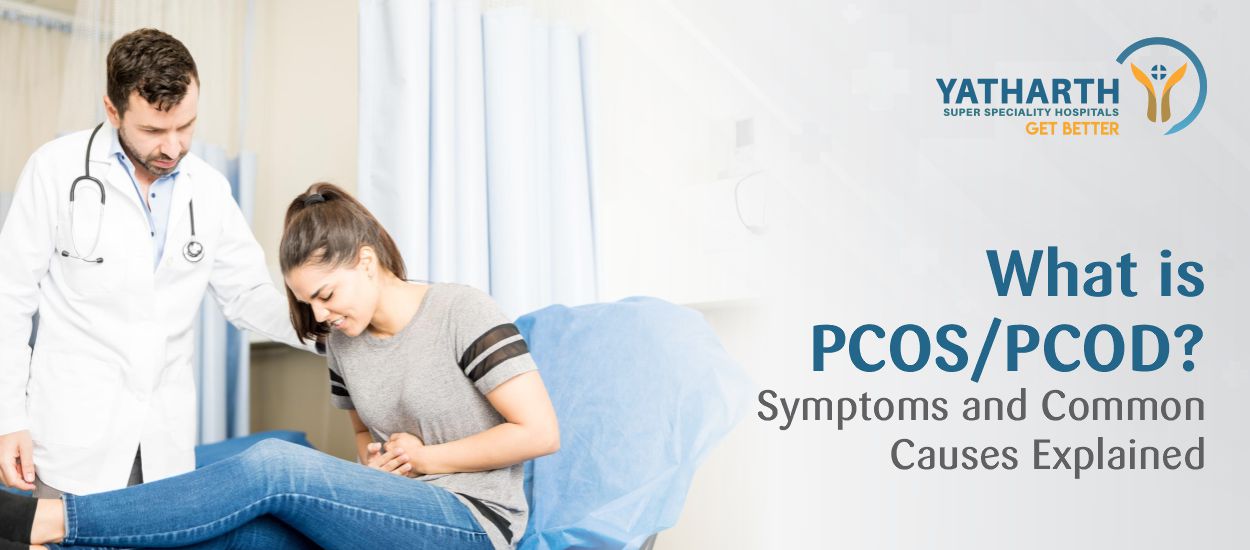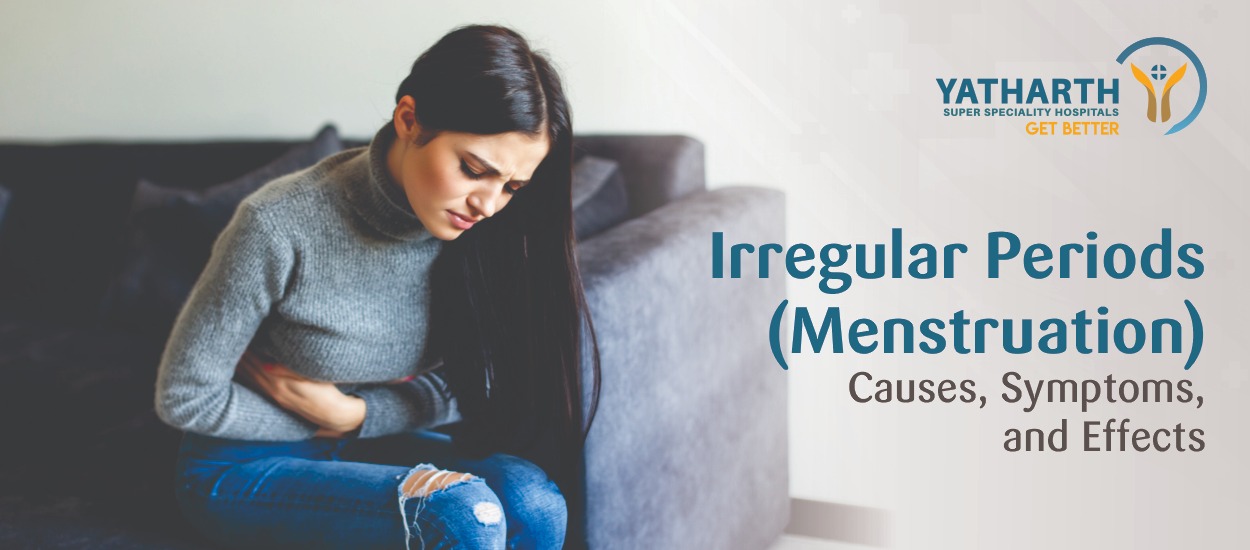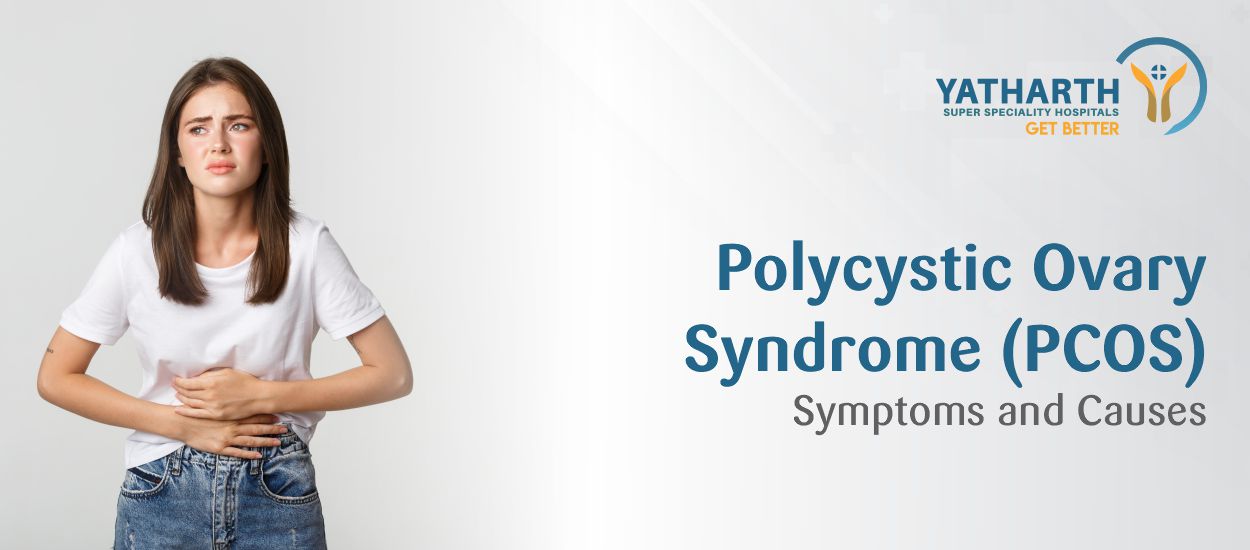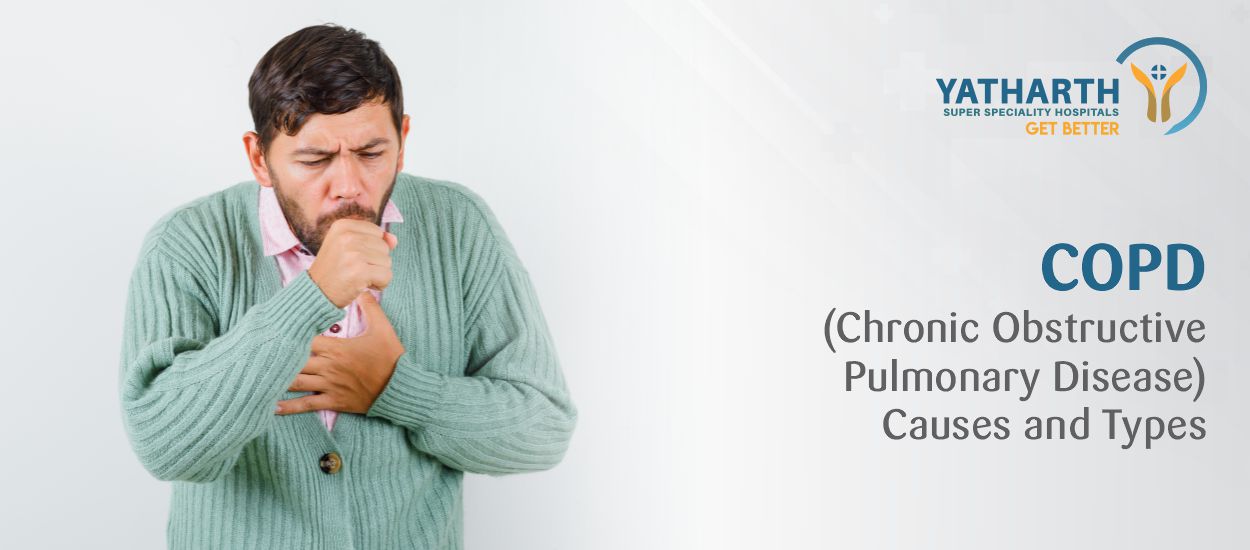These days, many women, including teenagers, are facing unexpected health changes such as irregular periods, sudden weight gain, acne, or unwanted hair growth, without realising that these could be signs of a hormonal imbalance such as Polycystic Ovary Syndrome (PCOS) or Polycystic Ovary Disease (PCOD). Once seen mostly in adults, these conditions are now affecting younger women at an alarming rate, often interfering with their fertility and overall well-being. While these conditions can be worrying, the good news is that both PCOS and PCOD are manageable with timely diagnosis, healthy lifestyle changes, and medical support.
In this article, we’ll explain PCOS and PCOD in detail, including the difference between the two, their common symptoms and causes, and when to consult a gynaecologist for proper evaluation and treatment.
Understanding PCOS and PCOD: What’s the Difference?
Polycystic Ovary Syndrome (PCOS) and Polycystic Ovary Disease (PCOD) are often used interchangeably, but they are not entirely the same. Both affect the ovaries and hormones, yet they differ in how they develop, their severity, and their impact on fertility and overall health.
PCOS
PCOS is a hormonal disorder in which the ovaries produce higher-than-normal levels of androgens (male hormones), leading to irregular ovulation or no ovulation at all. This hormonal imbalance can cause multiple small cysts to form on the ovaries, along with symptoms such as acne, hair growth, and difficulty conceiving.
PCOD
PCOD, on the other hand, is a functional condition of the ovaries, where immature eggs accumulate and form cysts due to hormonal and lifestyle factors. Ovulation still occurs in many cases, and fertility can often be restored through simple lifestyle changes and medical guidance.
Here’s a quick look at how the two conditions differ:
|
Aspect |
PCOS |
PCOD |
|
Nature |
Hormonal disorder affecting multiple body systems |
Ovarian condition caused by hormonal imbalance |
|
Ovulation |
Often absent or irregular |
Usually delayed but can still occur |
|
Hormonal Impact |
Higher androgen levels leading to acne, hair growth, and metabolic issues |
Mild hormonal imbalance without severe systemic effects |
|
Fertility |
Can cause infertility if untreated |
Fertility usually retained with timely management |
|
Severity |
More severe and long-term |
Comparatively milder and often reversible |
|
Management |
Requires medical and lifestyle interventions |
Often managed through diet and exercise changes |
Common Symptoms of PCOS and PCOD
The symptoms of PCOS and PCOD can vary from one woman to another, depending on hormone levels, age, and lifestyle. In many cases, these signs may appear subtle at first, which is why the condition often goes undiagnosed until it begins to affect menstrual cycles or fertility. Recognising early warning signs is key to timely treatment and better hormonal balance.
Common symptoms of PCOS and PCOD include:
-
Irregular or missed periods: The most common symptom caused by hormonal imbalance and irregular ovulation.
-
Weight gain or difficulty losing weight: Especially around the abdomen due to insulin resistance.
-
Acne and oily skin: Resulting from higher androgen (male hormone) levels.
-
Excessive facial or body hair (hirsutism): Common on the face, chest, or abdomen.
-
Hair thinning or scalp hair loss: A sign of hormonal imbalance similar to male-pattern baldness.
-
Fertility issues: Irregular ovulation can make it harder to conceive.
-
Fatigue or mood swings: Linked to fluctuating hormone levels and sleep disturbances.
-
Darkened skin patches: Often seen around the neck, armpits, or groin due to insulin resistance.
That said, not all women experience every symptom. For some, signs may be mild, while for others, they may cause significant changes in appearance, metabolism, or emotional well-being. Early evaluation by a gynaecologist can help detect hormonal imbalance before it leads to long-term complications.
Causes and Risk Factors of PCOS and PCOD
The exact cause of PCOS and PCOD is not fully understood, but several interlinked factors contribute to their development. Hormonal imbalance, genetics, and lifestyle patterns all play a role in disrupting normal ovarian function and hormone production. Understanding these underlying causes helps in prevention and effective long-term management.
Key causes and risk factors include:
-
Hormonal imbalance: Elevated levels of androgens (male hormones) interfere with the regular release of eggs, leading to the formation of cysts in the ovaries.
-
Insulin resistance: When the body does not use insulin effectively, it can raise insulin and androgen levels, triggering irregular ovulation and weight gain.
-
Genetic predisposition: Women with a family history of PCOS, diabetes, or irregular periods have a higher risk of developing these conditions.
-
Unhealthy lifestyle: Poor diet, physical inactivity, and chronic stress can worsen hormonal fluctuations and insulin resistance.
-
Obesity: Excess weight increases insulin levels and disrupts hormonal balance, making symptoms more severe.
-
Inflammation and stress: Low-grade inflammation and high cortisol levels can influence ovarian hormone production.
While these factors increase the likelihood of developing PCOS or PCOD, a healthy lifestyle, balanced diet, and regular health check-ups can help prevent hormonal imbalances and manage symptoms effectively.
How is PCOS and PCOD Diagnosed?
Diagnosing PCOS and PCOD requires a combination of medical history, physical examination, and specific diagnostic tests. Because their symptoms often overlap with other hormonal conditions, a detailed evaluation helps doctors confirm the diagnosis and create a personalised treatment plan. Typically, the diagnosis includes:
-
Medical history and symptom review: The doctor asks about menstrual patterns, weight changes, acne, hair growth, and family history of hormonal or metabolic disorders.
-
Physical examination: Assessment of body weight, BMI, and signs of hormonal imbalance such as acne, hair growth, or skin pigmentation.
-
Pelvic ultrasound: A non-invasive scan used to check the ovaries for multiple cysts and assess their size and appearance.
-
Blood hormone tests: Measures levels of hormones such as luteinising hormone (LH), follicle-stimulating hormone (FSH), testosterone, prolactin, and thyroid hormones to identify hormonal imbalances.
-
Insulin and glucose tests: Detect insulin resistance and blood sugar irregularities that are common in women with PCOS.
-
Lipid profile and metabolic tests: Evaluate cholesterol and triglyceride levels, which can be affected by long-term hormonal disturbances.
Early and accurate diagnosis helps in preventing complications such as infertility, obesity, and type 2 diabetes. Women experiencing persistent symptoms should consult a gynaecologist for proper evaluation rather than self-medicating or delaying care.
Treatment and Management Options for PCOS and PCOD
Although there is no single cure for PCOS or PCOD, both conditions can be effectively managed with the right combination of medical treatment and lifestyle changes. The goal of treatment is to restore hormonal balance, regulate menstrual cycles, and reduce long-term health risks such as infertility, diabetes, and obesity.
Common treatment approaches include:
-
Lifestyle modification: A balanced diet, regular exercise, and adequate sleep form the foundation of management. Even a modest weight loss of 5-10% can significantly improve hormone levels and restore regular periods.
-
Medications for hormonal balance: Birth control pills or hormonal therapy may be prescribed to regulate menstrual cycles, control acne, and reduce excess hair growth.
-
Ovulation-inducing medicines: For women trying to conceive, drugs that stimulate ovulation can improve fertility outcomes.
-
Insulin-sensitising medicines: Medications that improve insulin sensitivity help manage blood sugar levels and reduce androgen production.
-
Treatment for skin and hair concerns: Dermatological therapies can help address acne, pigmentation, and hair thinning caused by hormonal fluctuations.
-
Counselling and stress management: Emotional support, yoga, or guided counselling can help manage anxiety and mood changes often associated with hormonal disorders.
Regular follow-ups with a gynaecologist are crucial for monitoring progress and adjusting treatment plans. With consistent care, most women are able to manage symptoms effectively, achieve hormonal balance, and maintain long-term reproductive health.
PCOS and PCOD: Effects on Fertility and Reproductive Health
Both PCOS and PCOD can affect a woman’s ability to conceive naturally, mainly due to irregular ovulation or hormonal imbalance. When ovulation does not occur regularly, it becomes harder for an egg to be released and fertilised, leading to challenges in achieving pregnancy.
In PCOS, the higher levels of androgens and insulin resistance can prevent the ovaries from releasing eggs consistently, while in PCOD, ovulation is delayed but may still occur periodically. This means that while fertility can be temporarily affected, it is not permanently lost. With timely diagnosis and proper treatment, many women are able to conceive successfully.
Doctors may recommend fertility-focused treatments such as ovulation-inducing medication, hormone therapy, or assisted reproductive techniques (ART) if required. Maintaining a healthy weight, balanced diet, and regular exercise routine also improves ovulation and enhances the chances of conception.
With the right medical guidance and emotional support, women with PCOS or PCOD can achieve a healthy pregnancy and sustain long-term reproductive wellness.
When to See a Gynaecologist?
Early consultation with a gynaecologist can make a significant difference in managing PCOS and PCOD effectively. Because the symptoms often develop gradually and may seem minor, many women delay seeking help until fertility problems or other complications arise. Recognising when to seek medical attention is key to early diagnosis and better outcomes.
You should consult a gynaecologist if you notice:
-
Irregular, missed, or very heavy menstrual cycles
-
Persistent acne, unwanted hair growth, or hair thinning
-
Unexplained weight gain, especially around the abdomen
-
Difficulty conceiving despite trying for several months
-
Dark patches of skin around the neck, armpits, or thighs
-
Fatigue, mood changes, or symptoms of anxiety and depression
A gynaecologist can evaluate hormonal levels, perform necessary tests, and create a personalised treatment plan. Timely medical advice not only helps manage symptoms but also prevents long-term risks such as diabetes, heart disease, and fertility complications.
Why Choose Yatharth Hospital for PCOS and PCOD Care?
Managing PCOS and PCOD requires more than symptom relief; it needs a comprehensive, long-term approach tailored to each woman’s unique hormonal and reproductive health needs. At Yatharth Hospital, patients receive complete PCOS and PCOD care under one roof, combining medical expertise with personalised lifestyle guidance for lasting results. We offer:
Experienced Specialists
Our team of experienced gynaecologists and endocrinologists has been helping women manage hormonal disorders such as PCOS and PCOD with compassion and precision. From diagnosis to recovery, each patient’s treatment plan is personalised to address both immediate concerns and long-term health goals.
Advanced Diagnostic Facilities
With state-of-the-art ultrasound imaging, hormone profiling, and metabolic testing, Yatharth Hospital ensures accurate and timely diagnosis. Our NABH-accredited facilities are equipped to perform detailed assessments that guide effective, evidence-based treatment.
Holistic Treatment and Lifestyle Support
Beyond medical management, Yatharth Hospital focuses on sustainable lifestyle improvement through nutrition counselling, weight management programmes, and fertility support. Patients receive guidance to regulate menstrual cycles, improve fertility, and enhance overall well-being.
At Yatharth Hospital, care is centred on understanding each woman’s journey, helping restore hormonal balance, promote fertility, and improve quality of life with compassion and expertise.
Home Remedies and Lifestyle Tips for Managing PCOS and PCOD
Lifestyle plays a crucial role in managing PCOS and PCOD symptoms. While medical treatment is essential, simple home-based remedies and daily habits can help improve hormone balance, reduce insulin resistance, and restore menstrual regularity.
Effective home remedies and lifestyle tips include:
-
Balanced diet: Include whole grains, leafy vegetables, fresh fruits, lean proteins, and foods rich in omega-3 fatty acids such as flaxseeds and walnuts.
-
Limit refined sugar and processed foods: Reducing sugary snacks and white flour products helps control insulin levels.
-
Stay active: Aim for at least 30 minutes of physical activity such as brisk walking, yoga, or cycling to improve metabolism and maintain a healthy weight.
-
Hydration: Drink enough water throughout the day to support digestion and hormonal balance.
-
Sleep and stress management: Regular sleep and relaxation practices like meditation or breathing exercises help reduce cortisol, which can worsen hormonal imbalance.
-
Natural remedies: Some women find relief with spearmint tea (helps reduce androgens) or cinnamon (improves insulin sensitivity), though these should complement and not replace medical care.
Prevention of PCOS and PCOD
Although PCOS and PCOD cannot always be completely prevented, maintaining a healthy lifestyle can significantly reduce the risk and prevent symptoms from worsening. Early awareness and proactive care are key to hormonal balance and long-term health.
Simple ways to lower the risk include:
-
Maintaining a healthy body weight through regular exercise and portion control.
-
Choosing nutrient-rich meals with more fibre, healthy fats, and low-glycaemic index foods.
-
Avoiding smoking and excessive alcohol consumption, which disrupt hormone regulation.
-
Getting adequate sleep and managing stress through yoga, mindfulness, or hobbies.
-
Scheduling regular health check-ups and consulting a gynaecologist if menstrual irregularities persist.
Making these lifestyle changes early, even before symptoms appear, helps protect metabolic and reproductive health in the long run.
Seeking Timely Care for PCOS and PCOD
PCOS and PCOD are increasingly common but highly manageable with early diagnosis, consistent follow-up, and the right treatment. Paying attention to symptoms such as irregular periods, acne, or hair growth can help detect hormonal imbalance early and prevent long-term complications. With expert medical care, lifestyle modification, and emotional support, most women can regain hormonal balance and live healthy, fulfilling lives.
To book an appointment or consult a specialist at Yatharth Hospital, book an appointment online.















